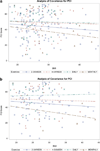Potential factors associated with perceived cognitive impairment in breast cancer survivors
- PMID: 25832894
- PMCID: PMC4586297
- DOI: 10.1007/s00520-015-2708-7
Potential factors associated with perceived cognitive impairment in breast cancer survivors
Abstract
Purpose: This cross-sectional study was designed to explore potential factors associated with perceived cognitive impairment (PCI) in breast cancer survivors compared to controls and gain insight into perceived levels of severity for cognitive complaints.
Methods: Women (N = 363, 317: breast cancer, 46: healthy controls) completed demographic questionnaire, MD Anderson Symptom Inventory, Attentional Function Index, and Functional Assessment for Cancer Therapy-Cognition. Group classification included pre-chemotherapy, current chemotherapy, and postchemotherapy (<1, >1- < 2, >2- < 5, >5 years).
Results: A significant group effect was seen for PCI (F 6, 355 = 7.01, p < 0.0001). Controls reported less PCI than all other groups. Neuropathy was inversely correlated with PCI (r = -0.23; p < 0.0001) for participants with breast cancer. A significant association was demonstrated between exercise frequency and PCI in women exposed to chemotherapy (F 3, 135 = 3.78, p < 0.05). A multiple linear regression model built using forward selection methods explained 24 % of the variance (adjusted R (2)) for PCI in breast cancer participants and included group, body mass index (BMI), exercise, fatigue, and distress. Exercise frequency moderated the relationship between BMI and PCI for breast cancer participants (F 3, 198 = 2.4, p = 0.07) and reduced the negative effects of high BMI. The moderating effect of exercise was significant (F 3, 133 = 3.1, p = 0.03) when limited to participants exposed to chemotherapy.
Conclusions: PCI decreased for women >5 years postchemotherapy. Overweight survivors who exercised frequently reported less PCI than sedentary survivors. Study results provide support for a relationship between BMI and PCI in breast cancer survivors and exercise as a potential intervention for cognitive complaints. Further investigation of the influence of weight and exercise on cognitive function is warranted.
Keywords: Breast cancer; Chemotherapy; Cognitive function; Exercise patterns; Neuropathy; Obesity.
Conflict of interest statement
Figures
References
-
- National Institutes of Health Office of Cancer Survivorship. 2015 http://cancercontrol.cancer.gov/ocs/statistics/definitions.html.
-
- Collins B, MacKenzie J, Tasca GA, Scherling C, Smith AD. Cognitive effects of chemotherapy in breast cancer patients: a dose-response study. Psychooncology. 2013;7:1517–1527. doi: 10.1002/pon.3163. - DOI - PubMed
-
- Koppelmans V, Breteler MM, Boogerd W, Seynaeve C, Gundy C, Schagen SB. Neuropsychological performance in survivors of breast cancer more than 20 years after adjuvant chemotherapy. J Clin Oncol. 2012;30:1080–1086. - PubMed
-
- Hess LM, Insel KC. Chemotherapy-related change in cognitive function: a conceptual model. Oncol Nurs Forum. 2007;24:981–994. - PubMed
Publication types
MeSH terms
Grants and funding
LinkOut - more resources
Full Text Sources
Other Literature Sources
Medical
Miscellaneous


